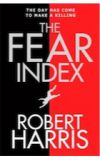
27 Oct 2011 10:00:06
Britain, though, features only in the occasional flashback memory of its characters, with the 24 hours of action playing out in Switzerland. Living in reclusive luxury beside Lake Geneva, Dr Alexander Hoffman, an American physicist married to an English artist, is number 177 on the Sunday Times rich list, calculating his own wealth as "a billion, a billion-two". He has stacked up this cash by applying the science he learned when working on the Large Hadron Collider at Cern to the running of a hedge fund. Hoffman has constructed a "machine-learning algorithm", a super-computer which trades instinctively around the world after analysing data including market behaviour and news stories.
Crucially to both the plot and Harris's broader theme, this dealer-machine, called VIXAL-4, feeds on fear, anticipating flights from stock before flesh-and-blood brokers make them. The premise is expressed in a rather dodgy aphorism that has been picked out and magnified in the book's publicity: "Fear is probably the strongest human emotion, period. Whoever woke at four in the morning because they were feeling happy?"
Well, children at Christmas and adults in the first flush of a love affair. But this is a rare false note. VIXAL-4 succeeds partly by keeping a close eye on the news and clearly so does Harris: the plot ingeniously combines a number of recent phenomena (financial, political, online, artistic) covered by journalism. The tension is also considerable as readers apprehend early on that the artificially intelligent broker is a financial HAL; as in 2001: A Space Odyssey, the question is whether the computer has moved beyond the control of its creator. Hoffman's own fear index soars as he suffers a physical assault in his mansion and an apparent cyber-attack which seems to have no obvious author.
Like an episode of The Simpsons, a Harris novel offers a range of allusions for different audiences. Enjoyable as a techno-thriller in the mode of Michael Crichton (whose quasi-scientific style seems to be echoed in some sections), The Fear Index also has clever chapter epigraphs from Darwin, while other readers will note that one character has the name of Byron's doctor and another, an Englishman called Quarry, carries hints of a character and a recurrent word in the novels of Graham Greene. The gossipy may also wonder if the details of life among the Swiss super-rich draw on the exile in that country of the novelist's cinematic collaborator Polanski.
Harris is an admirer of John le Carré (whose biography he once began to write), and there are echoes of the master in the prose, especially the laconic cataloguing of back-story. Quarry has "an ex-wife and three children safely stowed in a gloomy Lutyens mansion in a drizzled fold of Surrey". Harris's own speciality is comparisons drawn from natural history: a cellphone is a beetle, boots resemble toads and twisted, discarded black knickers look like a bat.
Grippingly dramatising the workings of the economy (I understood for the first time how hedge funds work), The Fear Index is, in another sense, an economic novel, not merely in its condensed time-scheme but its sparing wordage: though running to more than 400 pages, these are widely spaced and some carry fewer than 150 words. A speedy read, though, is the appropriate medium for a story in which many of the key events – deep in VIXAL-4's "brain" – take place in milliseconds.

